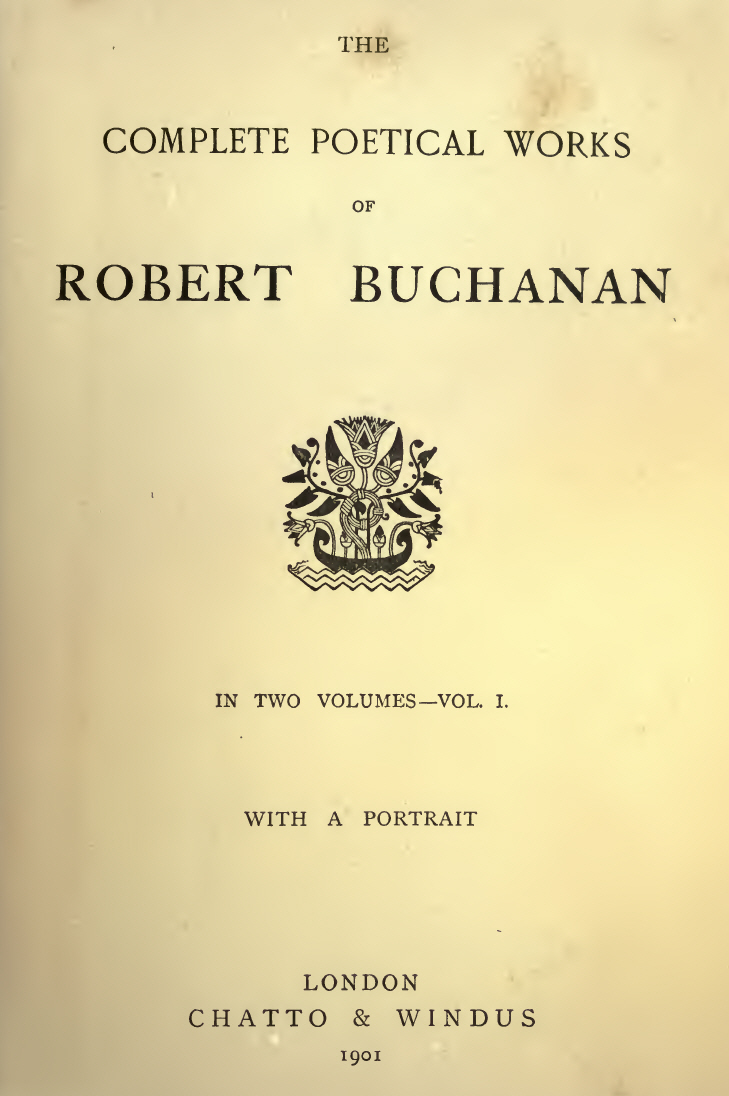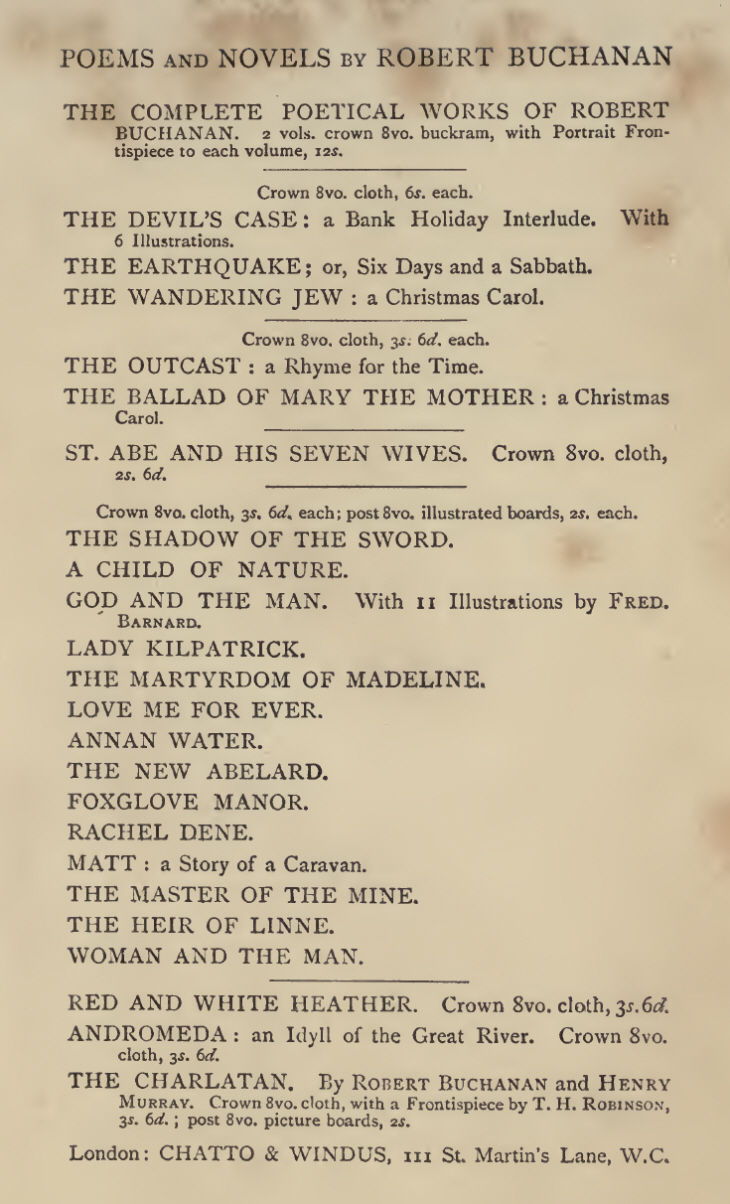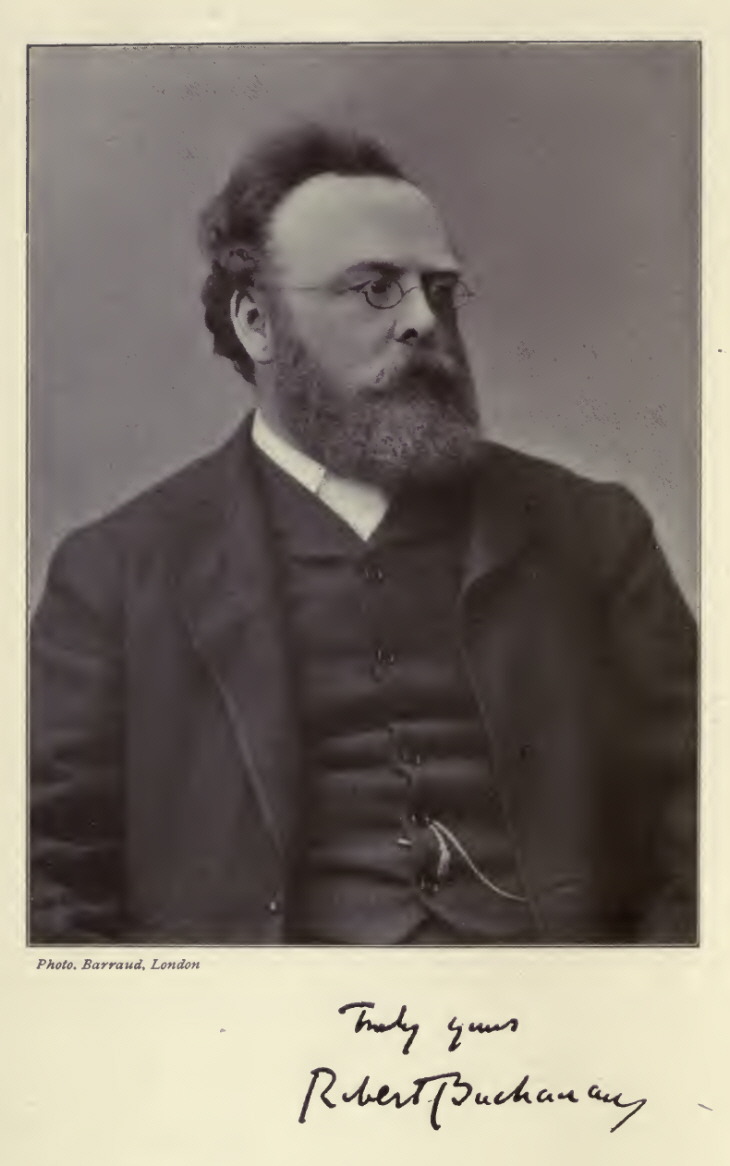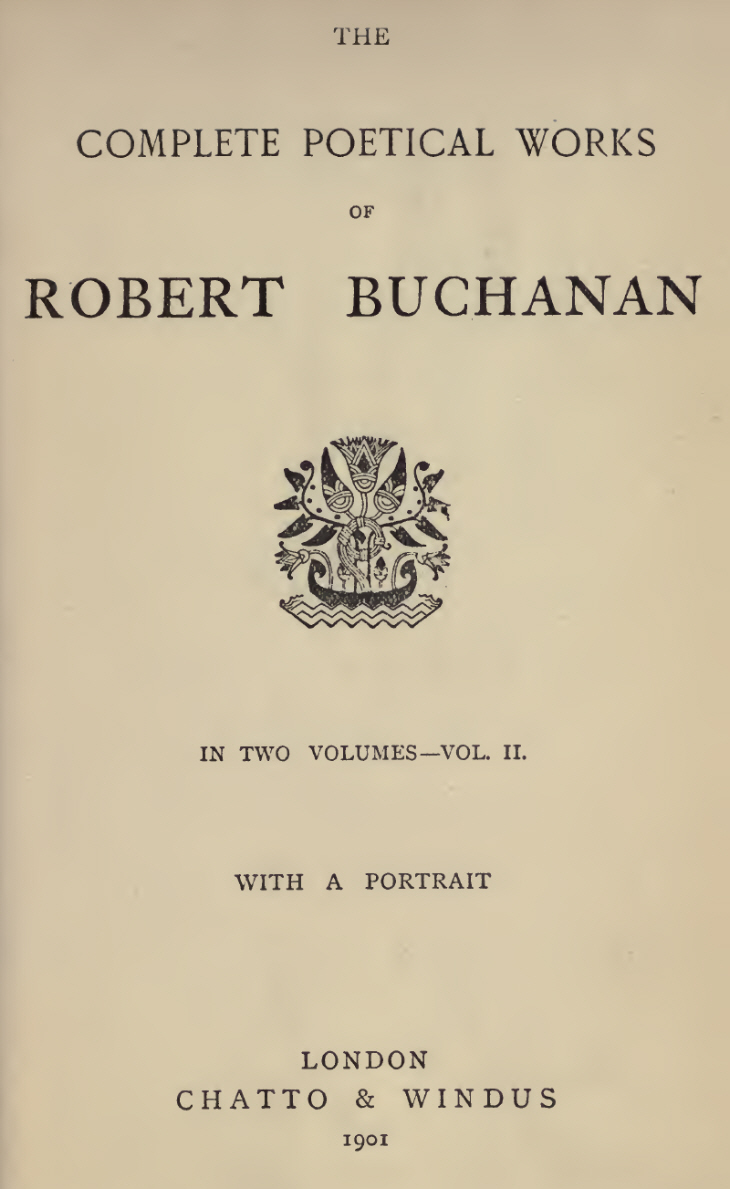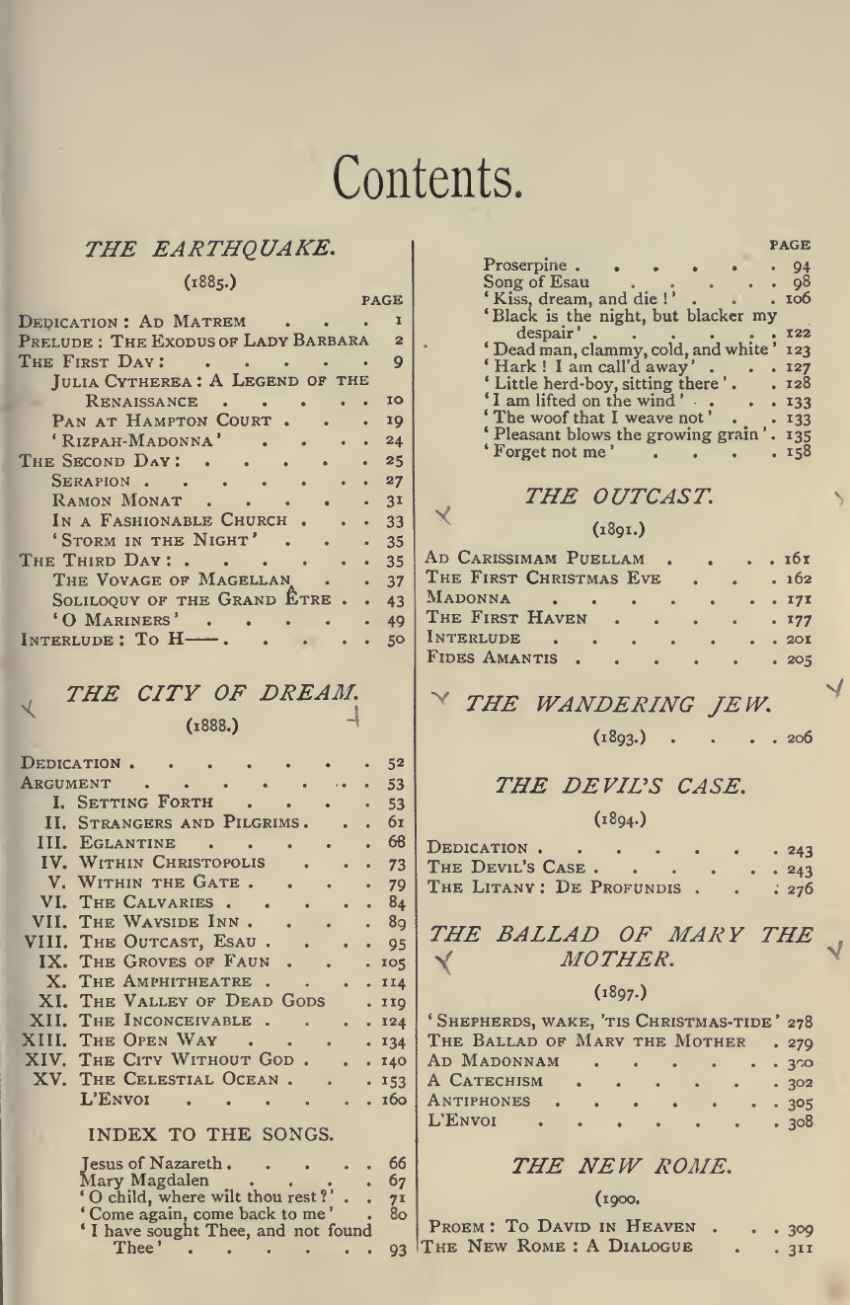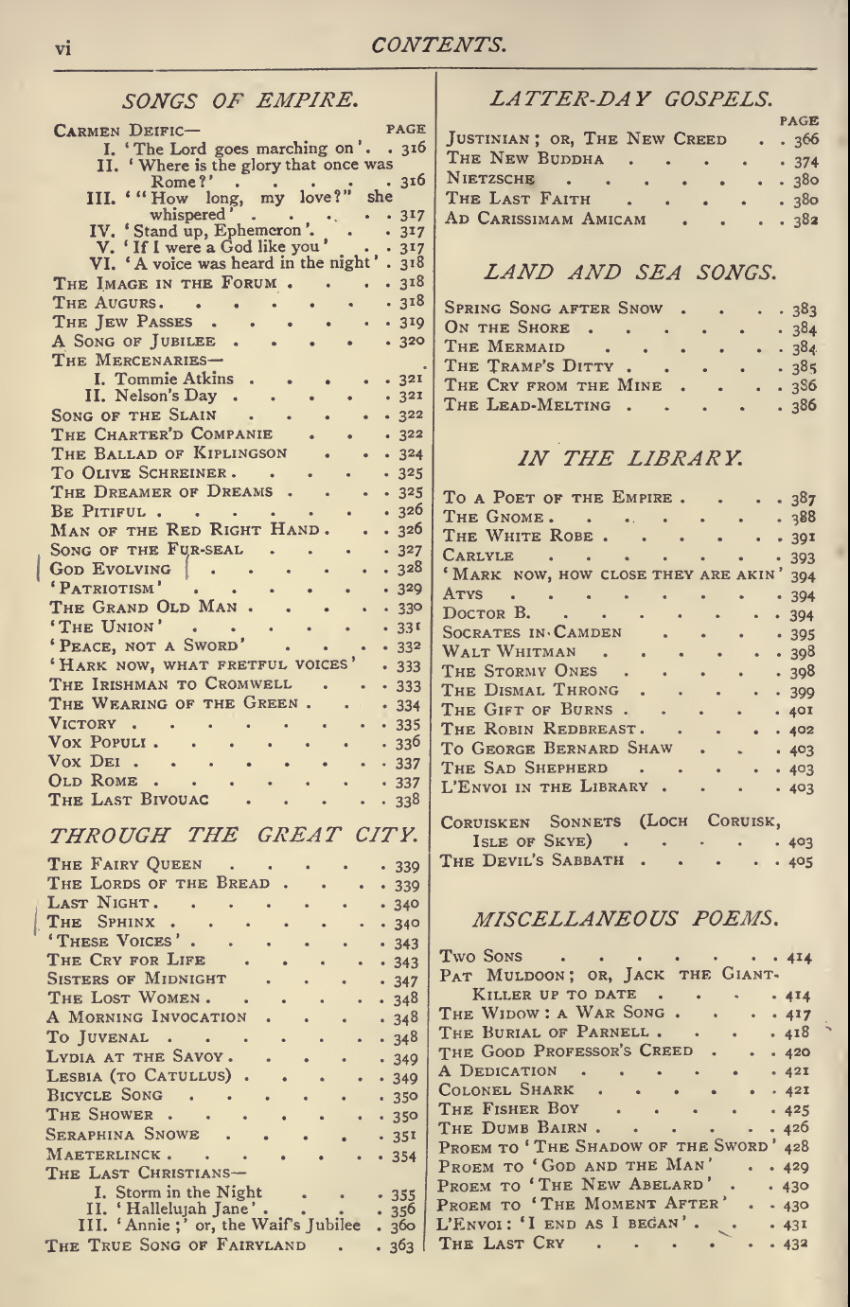|
THE EARTHQUAKE.
(1885.)
‘Dedication: Ad Matrem’
‘Prelude: The Exodus Of Lady Barbara’
‘The First Day:
Julia Cytherea: A Legend Of The Renaissance
Pan At Hampton Court
‘Rizpah-Madonna’’
‘The Second Day:
Serapion
Ramon Monat
In A Fashionable Church
‘Storm In The Night’’
‘The Third Day:
The Voyage Of Magellan
Soliloquy Of The Grand Être
‘O Mariners’’
‘Interlude: To H——’
___
THE CITY OF DREAM.
(1888.)
‘Dedication’
‘Argument’
‘I. Setting Forth’
‘II. Strangers And Pilgrims’
‘III. Eglantine’
‘IV. Within Christopolis’
‘V. Within The Gate’
‘VI. The Calvaries’
‘VII. The Wayside Inn’
‘VIII. The Outcast, Esau’
‘IX. The Groves Of Faun’
‘X. The Amphitheatre’
‘XI. The Valley Of Dead Gods’
‘XII. The Inconceivable’
‘XIII. The Open Way’
‘XIV. The City Without God’
‘XV. The Celestial Ocean’
‘L’Envoi’
Index To The Songs.
‘Jesus of Nazareth’
‘Mary Magdalen’
‘“O child, where wilt thou rest?”’
‘“Come again, come back to me”’
‘“I have sought Thee, and not found Thee”’
‘Proserpine’
‘Song of Esau’
‘“Kiss, dream, and die!”’
‘“Black is the night, but blacker my despair”’
‘“Dead man: clammy, cold, and white”’
‘“Hark! I am call’d away”’
‘“Litte herd-boy sitting there”’
‘“Where the buttercups so sweet”’
‘“I am lifted on the wind”’
‘“The woof that I weave not”’
‘“Pleasant blows the growing grain”’
‘“Forget not me”’
‘L’Envoi: “O blessed Death!”’
There are two songs missing from this Index, but present in the text:
‘”Where the buttercups so sweet”’
‘L’Envoi: “O blessed Death!”’
___
THE OUTCAST.
(1891.)
‘Ad Carissimam Puellam’
‘The First Christmas Eve’
‘Madonna’
‘The First Haven’
‘Interlude’
‘Fides Amantis’
___
THE WANDERING JEW.
(1893.)
___
THE DEVIL’S CASE.
(1894.)
‘Dedication.’
‘The Devil’s Case’
‘The Litany: De Profundis’
___
THE BALLAD OF MARY THE MOTHER.
(1897.)
‘“Shepherds, Wake, ’Tis Christmas-Tide”’
‘The Ballad Of Mary The Mother’
‘Ad Madonnam’
‘A Catechism’
‘Antiphones’
‘L’Envoi’
___
THE NEW ROME.
(1900.)
‘Proem To David In Heaven’
‘The New Rome: A Dialogue’
SONGS OF EMPIRE
‘Carmen Deific—
I. ‘The Lord goes marching on’
II. ‘Where is the glory that once was Rome?’
III. ‘”How long, my love?” she whispered’
IV. ‘Stand up, Ephemeron’
V. ‘If I were a God like you’
VI. ‘A voice was heard in the night’’
‘The Image In The Forum’
‘The Augurs’
‘The Jew Passes’
‘A Song Of Jubilee’
‘The Mercenaries—
I. Tommie Atkins
II. Nelson’s Day’
‘Song Of The Slain’
‘The Charter’d Companie’
‘The Ballad Of Kiplingson’
‘To Olive Schreiner’
‘The Dreamer Of Dreams’
‘Be Pitiful’
‘Man Of The Red Right Hand’
‘Song Of The Fur-Seal’
‘God Evolving’
‘“Patriotism”’
‘The Grand Old Man’
‘“The Union”’
‘“Peace, Not A Sword”’
‘“Hark Now, What Fretful Voices’”
‘The Irishman To Cromwell’
‘The Wearing Of The Green’
‘Victory’
‘Vox Populi’
‘Vox Dei’
‘Old Rome’
‘The Last Bivouac’
THROUGH THE GREAT CITY.
‘The Fairy Queen’
‘The Lords Of The Bread’
‘Last Night’
‘The Sphinx’
‘“These Voices”’
‘The Cry For Life’
‘Sisters Of Midnight’
‘The Lost Women’
‘A Morning Invocation’
‘To Juvenal’
‘Lydia At The Savoy’
‘Lesbia (To Catullus)’
‘Bicycle Song’
‘The Shower’
‘Seraphina Snowe’
‘Maeterlinck’
‘The Last Christians—
I. Storm In The Night
II. ‘Hallelujah Jane’
III. ‘Annie;’ or, The Waif’s Jubilee’
‘The True Song Of Fairyland’
LATTER-DAY GOSPELS.
‘Justinian; or, The New Creed’
‘The New Buddha’
‘Nietzsche’
‘The Last Faith’
‘Ad Carissiman Amicam’
LAND AND SEA SONGS.
‘Spring Song After Snow’
‘On The Shore’
‘The Mermaid’
‘The Tramp’s Ditty’
‘The Cry From The Mine’
‘The Lead-Melting’
IN THE LIBRARY.
‘To A Poet Of The Empire’
‘The Gnome’
‘The White Robe’
‘Carlyle’
‘“Mark Now, How Close They Are Akin”’
‘Atys’
‘Doctor B.’
‘Socrates In Camden’
‘Walt Whitman’
‘The Stormy Ones’
‘The Dismal Throng’
‘The Gift Of Burns’
‘The Robin Redbreast’
‘To George Bernard Shaw’
‘The Sad Shepherd’
‘L’Envoi In The Library’
‘Coruisken Sonnets (Loch Coruisk, Isle Of Skye)’
‘The Devil’s Sabbath’
The New Rome was Buchanan’s final volume of poetry, published in December, 1898. In the 1901 edition of The Complete Poetical Works of Robert Buchanan, ‘Pan At Hampton Court’ is not included since it was originally published as part of The Earthquake (1885), and the second poem in ‘The Last Christians’ - ‘I Saw on the Bridge of Sorrow’ (renamed ‘The Ballad of the Magdalen’ in the text) is also omitted, since it appears in its earlier incarnation as ‘Mary Magdalen’ from The City of Dream (1888). A section of ‘Miscellaneous Poems’ is also inserted between ‘The Devil’s Sabbath’ and ‘I End As I Began’.
MISCELLANEOUS POEMS.
‘Two Sons’ - from the 1874 Poetical Works, reprinted in Selected Poems (1882), which is the version used here.
‘Pat Muldoon; or, Jack The Giant-Killer Up To Date’ - according to several American newspapers, the poem was published in ‘Today of London’ some time before 25th November, 1899. According to Drummer Hodge: The Poetry of the Anglo-Boer War (1899-1902) by M. van Wyk Smith (Oxford: Clarendon Press, 1978), it was issued as a broadside by the International Arbitration League, but no date is given.
PAT MULDOON; OR, JACK THE GIANT-KILLER UP TO DATE.
‘BOYS, give the divil his due! He’s a man like me and you,
No wild baste!’ cried Drum-Major Pat Muldoon
To the new recruits from home, sailing southward o’er the foam
In the troopship, ’neath the shining tropie moon—
‘Give the blooming Boer his due; he’s a man, like me or you,
Tho’ like me or you he’s rusty when he’s riled—
If you scrape his rough old hide sure you’ll find a heart inside
That’s tinder to a woman or a child!
‘D’ye mind the time long past, when we met the beggars last?
(And begor’, they gave us beans on ’Juba Hill!)
I’d a cousin, Jack Molloy, who had join’d as drummer boy,
A devil’s imp—all mischief, never still!
And sure that same spalpeen, though only just fifteen,
And looking less than that—he was so small,
Could hold his own in jaw with the bloodiest Johnnie Raw
That ever hoped to dodge a cannon ball!
‘“Sure they’re Giants,” Jack would say, like the ones Jack wint to slay,
When he hid hisself and heard their “Fee! faw! fum!”
“It’s our English blood they smell, but we’re going to give them Hell,
And it’s me that will be there to strike ’em dumb!
I’m a soger! Jack’s my name! like that other known to fame!
And they’ll find me just as sharp and wide awake!”
We slapt him on the back, and cried, laughing, “Bravo, Jack!
You’re JACK THE GIANT-KILLER, no mistake!”
‘Well, our work was cut out soon, right up country,’ cried Muldoon,
‘And begorra, we’d our bellyfull at last,
For the Boers, like Giants grim, fierce of face, and strong of limb,
Came thronging all around us thick and fast!
But the drum and fife still played, and we faced thim undismayed,
Though many a gallant soger had to fall,
And ’twas Hell and Tommie there, and no time to think or spare,
And that little imp of Cain was in it all!
‘Well, not far from ’Juba Hill (where at last we got our fill,
Outnumber’d, squarely beat, as you’ve been told),
One night our camp was stormed, and the Dutchmen round us swarmed
Like flocks of hungry wolves around a fold!
Faith, like Giants thin indeed looked those men of mighty breed,
As they popt their shaggy heads out one by one!
And at every shot they sint, down a British soger wint,
And at last they made a dash—and we was done!
‘Back to back we gather’d there, facing grim death and despair,
While plop and ping the leaden rain did fall,
And ’twas thin I chanced to spy that young imp of Cain close by,
Still standing up, though wounded by a ball!
His drum was riddled through, but he shriek’d and cried “Hurroo!”
And waved a small six-shooter in his fist,
And he emptied his last shot from the barrels smoking hot
At a Giant wid a bushy beard—and missed!
‘Sure, boys, it was a sight I remember day and night,
Though it lasted but a moment, as it were:
That shrieking soger imp, like a little redbiled shrimp,
And that Ogre wid the shaggy beard and hair!
He look’d right down at Jack, waved the other Giants back,
As they rush’d along that shrieking kid to slay—
Then smiled (I saw him do it!), then, almost before I knew it,
Tuck’d Jack beneath his arm, and walked away!
‘Thin thinks I, his time is come! and I thought of “Fee! faw! fum!”
And the bloody tales I’d read before that day;
Tho’ we heard him squeal and call, sure we couldn’t help at all,
For the inemy were round us like the Say—
And before that Say we ran, back to back and man to man,
Till safe within our lines we breath’d once more.
“Well, good-bye to Jack,” I said, for I gave him up for dead,—
Yis, gobbled up and aten by the Boer!
‘Boys, some six weeks after that, as in camp our Tommies sat,
The news of peace thin spreading far and wide—
Up and down before our tint, smoking angry-like I wint,
For I thought of little Jack, and how he’d died—
And I longed to stand once more, wid my hand against the Boer,
To revenge the little divil caught and slain—
When I heard a loud laugh near, and a voice cried, “Pat, look ’ere!
It’s Jack the Giant-killer—back again!”
‘Holy Moses, it was him! There he stood, the divil’s limb,
In his regimintals old, but patch’d and neat—
And upon his head he wore a big hat (just like a Boer!)
And a pair of buckskin boots upon his feet;
And pale and worn and thin, wid a kind of sheepish grin,
He came among the laughing, shouting throng—
“Is it you, Jack, or your ghost? Sure we thought ye dead and lost!
Where the thunder have ye hid yourself so long?”
‘Thin he told us . . . such a tale! (and his face looked queer and pale,
Wid a quiet look it never had before)
How he’d lain for many a day, sick and wounded, far away,
A prisoner in the keepin’ of the Boer!
And the men began to laugh, crying round him in their chaff,
“Thin the Giants didn’t ate ye, Jack, me boy!”
“Garn! give the Boer his due, he’s a man like me or you,
Not a bloody raging baste,” said Jack Molloy.
‘Thin he told us how that night, when he vanish’d from our sight,
’Neath the armpit of that Giant wid the beard,
He felt the warm blood flow down his wounded side and so
He screech’d and swoon’d away—he was so skeered!
When he waken’d from that swoon—and he did wake!' said Muldoon,
‘He thought that he was gone to Kingdom Come,
For ’twas darkness all around, and he couldn’t hear a sound,
And all the world seem’d far away and dumb!
‘But, boys, he wasn’t dead! He was lying in a bed,
Still and warm, in folds of linen white as snow,
And around him in the gloom was a quiet, cosy room,
Wid a clock a-ticking, peaceful, soft, and low;
And he drew a long deep breath, thinking, “Sakes, if this is death,
It’s as comfy, sure, as any crib I’ve tried!”
Thin he tried to rise, in vain, for a quick, sharp stitch of pain
Ran through him, from the red wound in his side!
‘Just thin, as he lookt round, he seem’d to hear a sound
Close beside him, like a soft and quiet tread—
And he saw to his surprise, thro’ the mist that fill’d his eyes,
A shape that stood and listen’d by his bed.
’Twas a Woman, and thinks he (being fever-struck, d’ye see),
“Why, it’s mother!—I’m at home, though sick and weak!”
And “Mother!” faint he cried, and the Woman by his side
Bent above him, and a tear fell on his cheek!
‘Thin—the mist before his eyes seemed to clear away and rise,
And he saw she was a stranger, strong and tall,
Wid a cap on her white hair such as thim Boer women wear,
And not his own poor mother after all;
But the face he lookt upon, though ’twas sad and woe-begone,
Was kindly, and she took his little hand,
And smiling gintly now, while she stoopt and kissed his brow,
Said something that he could not understand!
‘Thin while, too weak to rise, he lookt up into her eyes,
He started, for he heard another tread,
And he saw, and sank back skeer’d, that big Giant wid the beard
Standing near him, blinking down upon the bed!
And thinks he, “My time is come,” for be thought of “Fee! faw! fum!”
And that Bloodybones was there at last to slay . . .
But the Giant’s face meanwhile wore a cur’ous kind o’ smile
And he nodded in a friendly sort o'’way!
‘Boys, what need to tell you more? He’d been carried by the Boer
To his farm among the mountains, as you’ve guessed,
And the Giant and his wife they had nurst him back to life,
And kept him like a young bird in a nest!
For they’d lost an only boy, who had been their hope and joy,
Jack’s own age, too, and his very size and make!
So when the Boer caught sight of young Jack amidst the fight,
He had saved him—for the little Dutchman’s sake. . .
‘O the rest, and O the calm, in that quiet upland farm,
Where Jack was nurst through thim long summer hours!
To watch in a half-dream, while the sleepy old mill-stream
Lay sprawling its fat fingers through the flowers!
Thin to sit in the sweet air, propt up in his armchair,
And to see the happy light across the land,
While the Mother bent her head o’er the Holy Book and read
In the lingo that he didn’t understand.
‘And the Giant? He’d come there, wid his shaggy beard and hair,
And grunt and grin and nod at Master Jack!
Or stretching out his paw, like a kindly grizzly bear,
He’d laugh and pat him gintly on the back!
O to feel the life increase, wid the sense of love and peace,
Forgetful of the world and all its care,
As Jack did! Little Jack! till they sent him smiling back!
Do I know it? Don’t I know it! I was there!
‘Yis, ye blooming Johnnie Raws, cease your lies and hold your jaws—
It’s a noble foe you’ll find across the Say!
Give the good old Boer his due—he’s a man like me or you—
Not an Ogre, or a ragin’ baste of prey!
Do I know it? Don’t I know it! Sure I’m livin’ here to show it!
Say I’m lyin’, and I’ll make ye change your tune;
For the name of that same boy wasn’t Jack, nor yet Molloy,
’Twas me that’s now Drum-Major Pat Muldoon!’
___
‘The Widow: A War Song’ -
THE WIDOW: A WAR SONG.
‘I know that you will always do your duty to your Sovereign and country, wherever that duty may lead you, and I pray God to protect you and bring you back safely home.’—THE QUEEN to her Soldiers.
‘STAND, Watchman, on the Castle height,
And southward gaze for me,
Beyond the day, across the night,
And say—What dost thou see?’
‘I see the clouds of battle lower,
Our hosts flock forth to slay! . . .’
The Widow, in her Palace bower,
Stood listening, old and gray.
‘Oh, Watchman, is it well with those
Who ’neath my banners stand,
Whose swords are drawn to smite my foes
In yonder far-off Land?’
‘Lady, their camps are red with blood,
Their kinsmen’s and their own . . .’
As pale as Death the Widow stood,
Sad-hearted and alone.
‘Oh, Watchman, look again and hark,
What dost thou hear and see?’
‘I hear a sobbing in the dark
Of widow’d souls like thee,—
I hear a sound that drowns in tears
The War-cry far away!’
That sound of sorrow in her ears,
The Widow knelt to pray.
‘Oh, Watchman, gaze across the night
And watch my hosts again,
For surely troops of Angels bright
Are hovering round the slain?’
‘Angels of Death in raiment red
Pass, but in wrath divine!’
The Widow moaned, ‘God help the Dead,
And loving hearts like mine!’
‘Oh, Watchman, seek the night afar
For Him, our God and Lord,—
Among those thunder-clouds of War
Doth He not wield the sword?’
‘Lady, indeed I see Him there,
But bow’d in woe like thee!’
The Widow, moaning in despair,
Pray’d still on bended knee.
‘Oh, look again! doth He not stay
To crown my glorious Dead?’
‘Lady, He rather turns away
To bless the widow’s bread,
To dry the weeping children’s eyes
Throughout the stricken Lands!’
Her gaze uplifted to the skies,
The Widow wrung her hands.
‘Oh, Watchman, doth He speak no word,
To be our strength and guide?’
‘Nay!—for the hand that draws the Sword
Must cast the Sword aside!
Thy Master is the Prince of Peace,
But holds no soul in thrall,—
’Tis theirs to bid the tempest cease
Who prayed that it should fall!’
‘Oh, Watchman, mark my sons once more!
Do they not pause and kneel?’
‘Lady, thy legions trample o’er
The necks beneath their heel;
They cry for Him, thy Lord, to bless
Their bloody loss and gain!’
She sobbed, ‘Christ, help the fatherless!’
And wrung her hands again.
‘Oh look and see, more near,’
The weeping Widow said,
‘How fare the men who loosen’d here
Those storms of wrath and dread,
Who swore to me that Christ our Lord
Would bless the Dream and Deed?’
‘Lady, around the laden board
They feast, while thousands bleed!’
‘My curse,’ she cried, ‘for evermore
On those false Chiefs and vain
Who drew by night across my door
The crimson cross of Cain!’
‘Lady, from land to land there runs
The sob of broken hearts,
While the brave life-blood of thy sons
Is priced in yonder marts!’
The royal Widow rose her height.
‘My path is dark,’ she said,
‘I prayed the Lord to lend me Light,
He sends me Death instead!’
‘Lady, when men forsake their Lord
His Light is ne’er their guide;
Only the hand that draws the sword
Can cast the sword aside.’
_____
The Complete Poetical Works of Robert Buchanan (1901) - continued
or back to Collections
|
